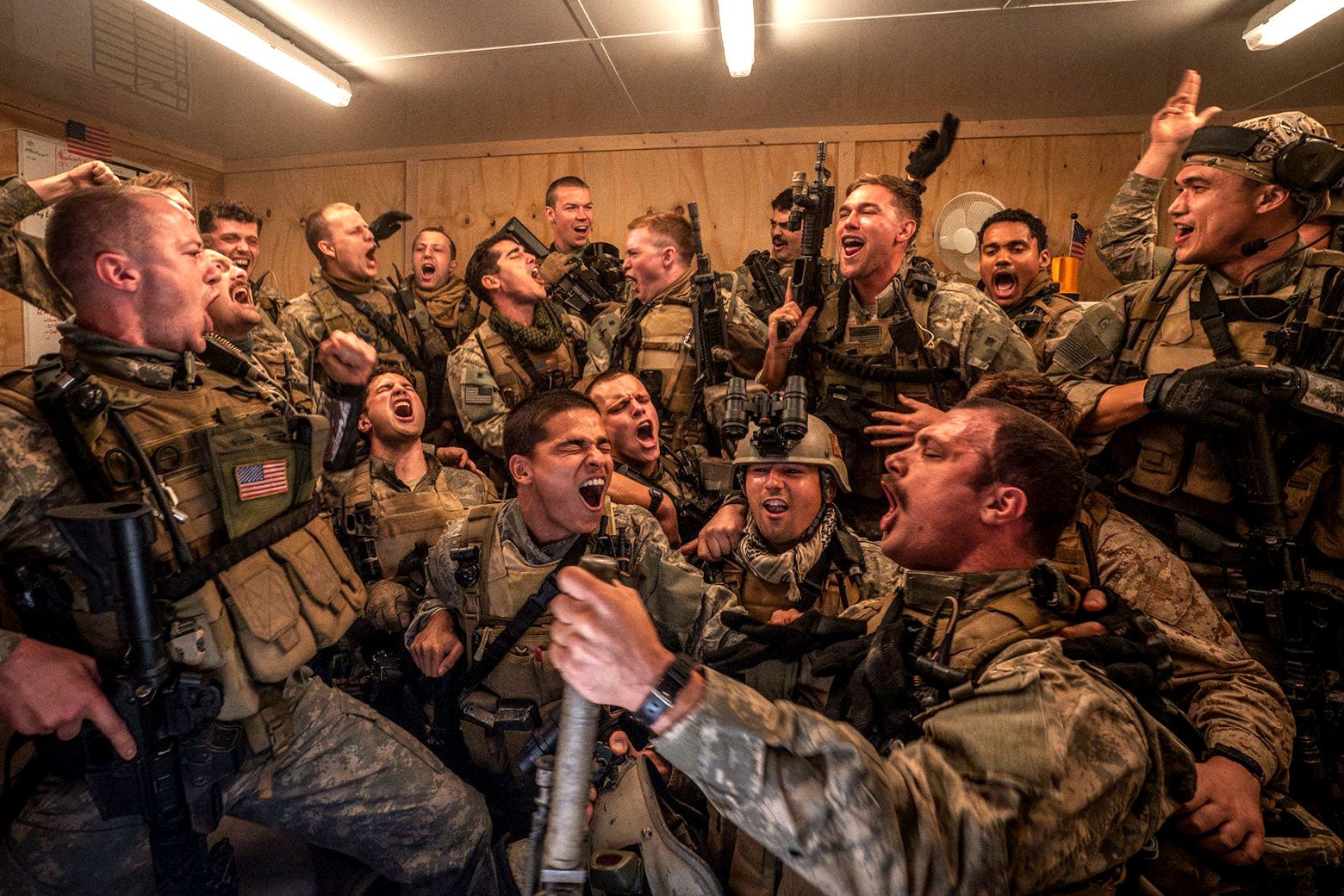The Hollow Frivolity of Warfare (2025)
Image Credit: A24
Silence.
The audience is provided with context of the setting: November 19th, 2006, Ramadi, Iraq. The final month of the Second Battle of Ramadi, which in total killed at least 75 American soldiers and an unknown number of Iraqi fighters. As is to be expected from Western coverage of war, the true numbers of the impacted population are forgotten from the narrative. Iraqi casualties included innocent civilians, some of them children, but this film isn’t about them.
Warfare is about the platoon of Navy SEALs taking sniper positions to support a US Marine operation - this film is about brotherhood.
Eric Prydz’sCall On Mebreaks the silence. The troops gathered round a now dated laptop, cheering as the women on screen gyrate. Finding solace in distraction, a party before the storm.

Credits: A-24
Watch this scene out of context, and you might even think it's pre-drinks footage from a fancy dress night. We see the boys bond, we see the laugh. The entirety of the song plays, placing us, the viewer, right in the centre of the platoon. Warfare is based almost entirely on their memory, so naturally, we are riding this wave with them.

Credits: A-24
The juxtaposition is stark as we are placed immediately into the streets of Ramadi.
Don’t be mistaken, this movie does not present war in a particularly positive light. We see the troops invade a residential street, making laddish jokes as they do so. Imitating the moves from the music video before traumatising a family by occupying their home in the middle of the night.
The image of a screaming family, begging the troops not to shoot their children in a language most of the soldiers don't understand, reinforces who the true victims are in this war: the innocent civilians, those who did not ask to be involved, yet are mercilessly dragged through the war machine.
Stationing themselves here, the troops disrupt normal life for the streets surrounding this house and all of its residents. The mere presence of the US Military is the catalyst for the film’s events. Their camouflage uniforms highlight them as a parasitic entity, benefiting from the resources that the local Iraqis provide, while bringing danger and destruction as a thank-you gift.
Throughout the runtime, the troops are stationed in somebody else’s home, and the family that lives there are holed up in a tiny room. The two members assisting the platoon who could speak Arabic are dead, so they receive zero explanation as to why they have been put through all this.
The troops are traumatised, or severely wounded, if they are (un)lucky enough to survive. The rosy cheeks of newbie Tommy (played by Kit Conner) quickly become stained with ash and tears. Officer in Charge Erik (Will Poulter) begins to mentally disintegrate, forcing him to pass control to his Assistant Officer in Charge.
The final minutes of the film before the credits display comparisons of the actors and their real-life counterparts. Compilations of the lads on set, giving us the behind-the-scenes, showing them all healthy, safe and happy.
But, this is not what stuck with me at its close.
Not the bond of these boys.

Credits: A-24
Before the title card at the beginning, we are presented with a photo of a smiling child, standing outside the intact house that the troops occupy.
This is what sticks with me.
This is the true theme of the film.
As the last of the troops depart, the dust settles leaving the family who live there to try to salvage what remains: the entire second floor of their home reduced to rubble, their floors soiled with the blood of those who invaded it just hours earlier - but they find solace in the fact that the troops are gone.
That is what is at the heart of this movie.
Peel back the layers of brotherhood and bonding, and you'll find it empty, with the single question of ‘why’ echoing throughout its walls. Warfare does not attempt an answer; there is no answer.
We learn nothing of the troops' backstory; we have no context as to who they are, why they are here, and what’s waiting for them at home. They are simply pawns, being moved on somebody else’s chessboard. Hailing from a country where Veterans have a higher likelihood of homelessness than non-veterans (making up 7% of the homeless population despite only occupying 6% of the total US population), it’s essential to ask whose ‘freedom’ these men are really fighting for?
Nothing gained, nothing won. Two men were severely injured, and two were dead. The Iraqi casualties have not been tallied.
The survivors are forever burdened with the weight of what happened in November 2006.

Credit: A-24
Over the past month, as tensions between the US and Iran have escalated, Warfare is an extremely timely watch. It serves as a reminder that there is no glory to be found on the battlefield, just a lifetime of trauma (and medical bills) that will follow you like a nasty rash.

